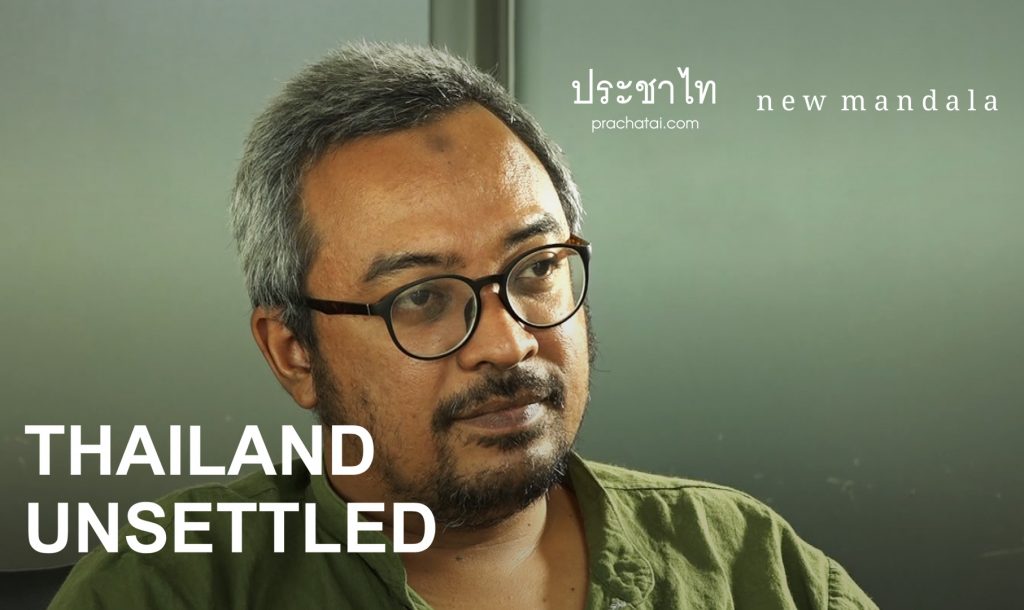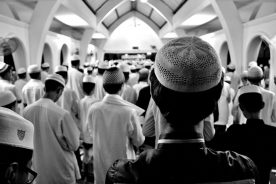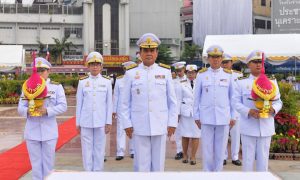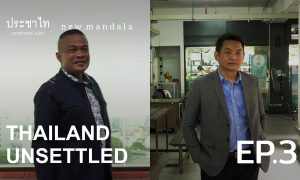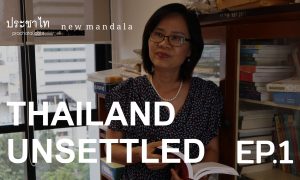The episode
How will the 2019 elections bear upon violent conflict in the Deep South? Episode 4 of Thailand Unsettled invites Romadon Panjor from Deep South Watch to interrogate the significance of a post-election government for the resistance movement operating in Pattani, Yala and Narathiwat, both inside and outside of peace talks. Covering issues from electoral violence, to the myth that the conflict is first and foremost about religion, to the networks of political parties in the three southernmost provinces, Romadon argues that understanding the ramifications of elections involves making a distinction between the Thai government and the Thai state.
The guests
Romadon Panjor holds the position of “curator” at Deep South Watch, an organisation “working as a lattice or decentralized network with an emphasis on creating a “common space” or “platform” in mobilisation of peace in areas of violent conflict, in this case, the deep south provinces of Thailand or Patani”. For more information on Deep South Watch, please see here.
Transcript
To begin, could you overview the situation in the three southernmost provinces. Who are the main actors?
The situation in Thailand’s Southern Border Provinces, or Patani as some call the region, is one where we are living among violent conflict. It has been about 15 years, if we take the theft of arms from a military base [in Narathiwat province] on 4 January 2004 as the beginning of the current round of violence. But the past 15 years has seen significant change; several new actors have entered the scene, both those who operate openly and those who do so covertly.
If we examine the number of violent incidents during the past 15 years, they peaked at two points followed by a decline—currently we are in the second period of decline. Violence first peaked during the period 2007–08, before waning, and then picked up again in 2012–13. Since then, violence has been dropping. Last year, 2018, was the year that saw the fewest incidents in the past 15 years, though the year’s end continuing into the beginning of this year did see some serious events occur. From the perspective of somebody involved or somebody in Thai society, those incidents would appear to be similar to the violence of the past, characterised by patterns comparable to what we have seen, or as a problem of violence that has yet to cease. But from the perspective of numbers, violent incidents are actually decreasing.
And there has been some change. The actors who have involved themselves in the conflict have diversified; the Thai government has cycled through several different prime ministers. Diverse structures and institutions, both civilian and military, have been established to deal with the situation. Laws have been promulgated. The most obvious example is the enforcement since 2010 of the Southern Border Provinces Administration Act, which underpins the Southern Border Provinces Administration Centre (SBPAC). Before that, the legislative assembly appointed after the 2006 coup passed legislation to establish a new version of the Internal Security Operations Command (ISOC). Once the violence had endured for some 4–5 years, outlasting both the Thaksin administration and one which emerged via a coup, the Thai state began to deal with it as a chronic and prolonged situation, and tried to lay down some special structures and institutions.
To put it another way: what the conflict of the past 15 years has left us with is a special and exceptional region which is administered and governed when it comes to conflict, territory, people and budgets in ways that are visibly differently from other parts of the country. The state institutions just described and special laws which are enforced strictly [in the Deep South]—when we compare these to other regions in the country, even though we have seen two coups, the southernmost provinces has always been governed by high security and the enforcement of various exceptional laws.
People in the region are caught in a conflict between two sides, and have fallen into a state that “กลืนไม่เข้าคายไม่ออก [cannot be swallowed but cannot be spat out; a dilemma]”. They are now administered under a system and regulations that operates through exceptional laws. Both the region’s development and the management of the conflict at a local level has been through special mechanisms, which have not only operated at the level of the Ministry of the Interior. These are things that have slowly changed the territory, the people, the relationship between the people and the territory, and the relationship between the people and the state.
Another phenomenon which has become visible, which I think was clearest in 2013, is the inception of the armed resistance movement into political process. This development has consequences. In the very least, people in the region can see that actors which previously mobilised stealthily—which people could sense were mobilising in some way—have emerged in the open and are in dialogue with the Thai government. What is interesting is that even though the [Yingluck] government had its power seized, the junta led by the then army commander in chief tried to continue the talks—even though it is a principle of security forces not to negotiate and bargain [with perceived rebels].
Why did violence peak in 2007–08 and 2012–13?
I think the first 2–3 years of the conflict marked the period were the resistance movement was most bent on escalation. When the movement met a government hostile to that resistance, a key method of suppression was the application of pressure upon civilians. In 2007, the government’s military operations involved forced searches aimed at destroying the military and political structure of the resistance. What followed was “summons” and the detainment of thousands of people outside of the region. All of this took place while the efforts of the resistance were fairly intense, with 2007–08 seeing numerous events of protest. Engagement between the two sides in 2007 was particularly high; the number of violent incidents was also.
Then, they dropped. One explanation was that the [previous Thaksin government] had destroyed the [military-based] structures that had existed to permeate the state’s power at the level of villages [in favour of an enhanced role for police forces, which inadvertently debilitated intelligence]. As a result, operations by soldiers declined, leading to a period of adjustment for both sides. In 2008, ISOC was established, with one important reason for its operations being the management of the problem in the southern border provinces. Of course, the government was dealing with other political confrontations at the time too, but the problem of the deep south was a significant one. SBPAC was also resurrected, with laws clearly legitimising its existence. Violence ceased to be the primary mechanism of control, while both sides engaged in the process of establishing new structures following 2008–09.
Violent incidents returned to being on the rise in 2012 because the mode of conflict was shifting from the field and villages and onto the negotiating table. As has been the case in other contexts, military operations were one tool for increasing bargaining power and leverage to ensure that one’s proposals were heard by the other side. All of these are hypotheses based on my own observations, but there was a palpable peak in violence in 2007 and 2012, before a drop. I understand that currently we’re in another period of some kind of adjustment.
How has conflict between Buddhist and Muslim communities in the aftermath of the 2014 coup compared to the situation before the coup? What processes may be able to alleviate distrust between the two communities—or is the question more of distrust between the local Malay Muslim community and the state?
Whether or not these issues are related to the coup is one issue. But the essence of the conflict has been obscured by the problem of a line separating “them” from “us”. This is fundamental. One misunderstanding about the conflict in the Southern Border Provinces is that it is a religious conflict. If we use that framework, the focus is placed on clashes or disagreement between the Buddhist and Muslim communities.
But my view is that [the religious conflict] follows from a more fundamental conflict, which is the political conflict around how Bangkok can govern in the southernmost provinces with enough legitimacy. For the nationalist movement that desires liberation, co-existing with the Thai state in the present day is beset by the grievance that their power was taken illegitimately. It is a political problem akin to a modern nation-state being faced with a minority that has a history of building a still unsuccessful nation-state of its own. The issue is that Patani views itself as a colony of Bangkok, while Bangkok sees Patani as long having been under its possession. This is the heart of the conflict.
And now we can see the strategy of both sides. At one time, the foundations of the Thai state rested on Buddhism, which undoubtedly drew a line of division. This constructed line benefits both sides insofar as it mobilises support from the populace and confers legitimacy upon their actions. Of course, the relationship between the communities on the ground has problems, as is usual for people who have different ways of living. There is both co-existence in some aspects, and disagreements in other aspects—the point is that those disagreements have been politicised.
When it comes to the peace dialogue, does it matter for the resistance whether they’re in negotiations with a military or civilian government?
This question is interesting. In 2012, when violence was peaking, there were efforts to expand channels for dialogue before the process of peace talks was formalised. According to information that I received at the time, the resistance posed a question to the government. You understand right? At the time, it was a civilian government, the Yingluck government. That question was: what does the military and palace think of your engaging us in dialogue?
If this information is true, it means the resistance does not see the state as ending with the government. Finding a resolution to the conflict in the Deep South, even if it is to be through political process, certainly cannot come without the military’s involvement. And it absolutely cannot come without approval of some kind from Thailand’s most important political institution. It ends with neither the government nor parliament.
That being said, in subsequent negotiations, one proposal from BRN [Barisan Revolusi Nasional] was that the initiation of the process of peace talks should be made a national matter—that it should receive the approval of parliament. The significance was that, for BRN, the peace talks had to be consented to by the representatives of the Thai people.
But pragmatically, the resistance understands that entering into peace talks with the Thai state involves more than the Thai government. The approval of [other] key institutions may be necessary and in this respect the military cannot be denied. Who exactly represents the military may be an unsettled question, but the involvement of military actors in peace talks is important, because the situation has been militarised. Ever since the 2006 coup, the military and the army (and perhaps through ISOC) have played an increasingly important role and the main role in dealing with the southernmost provinces, under both elected or military governments. That’s a reality that must be accepted.
I think that the resistance movement sees this. As for new developments in Thai politics over the last few months in this important period leading up to the election, I think those are also being monitored by a movement that must evaluate the ways in which the Thai state is currently evolving.
Suppose the NCPO is able to indirectly govern through the post-election government—what parameters does this place on the conflict in the deep south?
A worrying issue, and one worth reflecting upon, is that we’re living under a regime whose type scholars are still debating. Some say that we’re living under a hybrid system. [After the elections], we’ll be a “democracy” of a kind we’ve never seen before. [These questions of regime] certainly have the potential to affect the process of seeking a resolution to the conflict in the deep south, whether that solution is political or military.
This is because the problem in the Southern Border Provinces is larger than a question of government. It’s a problem of the state, in the sense that one section of the population does not consent to being part of the Siam state, the Thai state, and desires to secede. The problem is then larger than the question of who forms the new government.
Since the promulgation of the constitution all through this month leading up to the election, we have operated under conditions where it remains unsettled who speaks on behalf of the Thai state. Who has the final say? Who is really able to determine the direction taken when it comes to resolving issues at the level of the state? Where is the locus of that power? Is it Government House, parliament or entirely somewhere else? This is a fundamental issue because each possible answer involves a different target for those bargaining with the Thai government, whether that bargaining takes the form of political process, negotiations or military operations.
Just then, you asked whether it is preferable to be in peace talks with a civilian or military government. That question may be less important, because there is an even more challenging question: if you are to negotiate with the Thai state, who are you negotiating with?
How much support has the Prachachat party received in the region? [Editor’s note: the Prachachat party is said to be part of Pheu Thai’s network and designed to pull votes from Muslim voters in the Southern Border Provinces. That being said, the party is fielding in other 200 constituencies across the country].
We have to understand that the Prachachat party is undoubtedly attempting to present an image based on the Wadah group, even if they insist that they are no longer the Wadah group. [Editor’s note: The Wadah group is an influential faction of politicians from the Deep South. In 2001, they fielded candidates under Thaksin’s Thai Rak Thai, allowing the party to win seats in the otherwise Democrat Party-dominated southern region. From 2004, Wadah’s popularity declined in light of the Thaksin administration’s human rights abuses in the deep south]. This is “Wadah upgraded”.
We must not forget that throughout the conflict of the past 15 years, Wadah has struggled considerably. In the 2005 elections, after a year of violence or to be more specific just a few months after the Tak Bai incident, Wadah did not receive any seats. At the time, some thought that was already the end of Wadah. The 2011 elections were interesting in that Wadah fragmented between a number of different parties, with a number of members being elected into parliament. Their reunion in the Prachachat party is interesting, because the party’s driving force is drawn entirely from senior Wadah politicians. It may not be enough.
But one fundamental characteristic that must be understood about the three southernmost provinces is that politics there is only secondarily about policy—what matters most are individuals. And even larger than individuals or candidates alone are the networks commanded by their vote canvassers, which are really the main driving force of local electoral politics. When it comes to Prachachart, their policies are one matter, but the pooling of collective networks … though undoubtedly, there are challengers. For example, other parties and especially those allied with former members of Wadah or former electoral canvassers from Wadah. These groups draw upon different voter bases.
Another important issue is the gamble that the Prachachart party represents in the scheme of the long-standing conflict that lays the background of the election. It’s a high-stakes gamble. What’s involved is not only competition for the 11 or 12 constituencies in the deep south—it’s also a negotiation over how much political bargaining power [whoever forms government] is willing to allow the Malay people.
The image we saw in the 2011 elections was the mobilisation of some degree of state resources in support of certain political parties—now perhaps we are seeing something somewhat similar, though it’s not as clear as it was in 2011. But if Prachachat were to control a majority of seats in the three southernmost provinces, this would most likely unsettle some state officials. As such, events in the lead-up to the elections may help us to see how high-stakes the Prachachat gamble really is.
Are you worried about incidents of violence during the election period?
Given that the region is characterised by political conflict, it is possible that there will be violent incidents during the election period. And there is a pattern, from both the period prior to the 2016 referendum and even the election before that. There exists some research arguing that violence in the weeks immediately before the election could affect the tide of public opinion and impact how people vote, but these are hypotheses. There is precedent, but we don’t know for sure how it will play out.
How the resistance movement conceptualises the election currently remains an enigma. There are some hypotheses that suggest the movement does not see importance in the parliamentary system, which would explain the lack of clear line on who they support and how their supporters should vote. Currently, their supporters are being left to exercise discretion in who they back—left-leaning, right-leaning, forwards or backwards, it depends on them.
This theory is interesting if we look back at voting behaviour during the referendum and past elections. The three southernmost provinces have had some of the highest voter turnout—some constituencies have been in the top five across the country—but at the same time there has been a high proportion of spoiled ballots. Some view these spoiled ballots as reflecting the voices of those who do not want to vote. There has been no research to decisively substantiate these hypotheses, but they are points of discussion in the field about how the resistance conceptualises the elections.
What effect will the current constitution, which is widely viewed as aimed at prolonging the power of the NCPO, have upon the conflict in the deep south?
If we examine the results of the [August 2016] referendum, the three southernmost provinces stick out: there was visibly a high rate of “no” votes. The majority of the more than ten southern provinces voted in favour of the constitution; it was only the three southernmost provinces who voted no. In 2016, when it came to the constitution, the key issue were those articles that gave Buddhism a privileged status [Articles 67 and 70]. This issue exploded in the region to the point that people felt that the promulgation of the constitution would represent a reduction in the support and space that Muslim communities would receive from the state. The reality may be another matter, but that was the perception that people had of the constitution, which may have had an effect in terms of trust in the state and state officials independent of the military government.
Examining the text of the constitution is also interesting. People talk about decentralising power—before, I spoke about the heart of the conflict, the relationship Bangkok and Patani and disagreements over history that have persisted until now. One proposal would then be to reform the relationship of power between the southernmost provinces and the centre. In this respect, the 2017 constitution is slightly different from both the 1997 constitution and the 2007 constitution. The 2017 constitution makes mention of the capacities of regions that have the potential to self-govern—the document includes the phrase “the principle of self-government”—[capacities] in terms of the economy, population density and the demographics of the population.
To put to differently, the development is that the constitution is speaking of decentralisation or self-governance. Yes. But there are conditions about how ready [the regions have to be]. If we debate this seriously, it would lead to considerations and evaluations of the capabilities of regions. Are they self-sustaining? Can they govern themselves? How much assistance will they receive from the central government? In one respect, the constitution keeps open the possibility of an alternative [to the status quo]. But that alternative is conditional on considerations of feasibility. I believe [this development] will be an important factor in the search for a resolution to the conflict.
What’s the status of election monitoring organisations in the deep south?
On the ground, we’re seeing networks of organisations who work nationally, such as volunteers from the Election Commission. The Open Forum for Democracy Foundation (PNet) is trying to build a local network; We Watch is trying to find volunteers. Locally, there are also some efforts to build up groups to monitor and inspect the elections, such as Projek Sama Sama. Attempts are being made to keep the elections transparent—how successful they will be and the weight they will carry is another issue.
Making Thailand’s southern peace dialogue meaningful
Prayut has told media that the peace dialogue is “not about negotiation”.
[Editor’s note—In light of developments in the aftermath of the interview, Romadon requested the insertion of the following comment: “Yesterday [17/3/2019 or the day for advance voting] I saw a car belonging to the Asian Network for Free Elections (ANFREL) in front of a polling booth. In reflection of these developments then, we might specify merely that the monitoring of the elections by international organisations is rather limited.
Projek Sama Sama is a collaboration between new generation activists from a diverse range of backgrounds as well as organisations that are trying to keep an eye on this round of elections. My team and I are also involved. We’re trying to lay the groundwork for the monitoring of political process, including future peace-talks. For more information please follow our Facebook page.”]
The series
Thailand Unsettled debates the current state of Thailand’s politics, keeping the question of a post-election future at the forefront of discussion. How are new and established political parties gearing up for an election that is stacked against them? Do current red-shirt leaders and former yellow-shirt leaders believe reconciliation is possible in the absence of justice? Does a new reign call for new frameworks of analysis? Tune in for conversations with Thailand’s political leaders, activists, civil society and academic community.
Thailand Unsettled is filmed in partnership with Prachatai, an award-winning news-site committed to accurate reporting under conditions of limited freedom of expression. For English captions, make sure subtitles are turned on by clicking the “CC” button at the bottom-right hand corner of the Youtube video. For a Thai transcript of the interview, head over to Prachatai’s website.
 Facebook
Facebook  Twitter
Twitter  Soundcloud
Soundcloud  Youtube
Youtube  Rss
Rss 